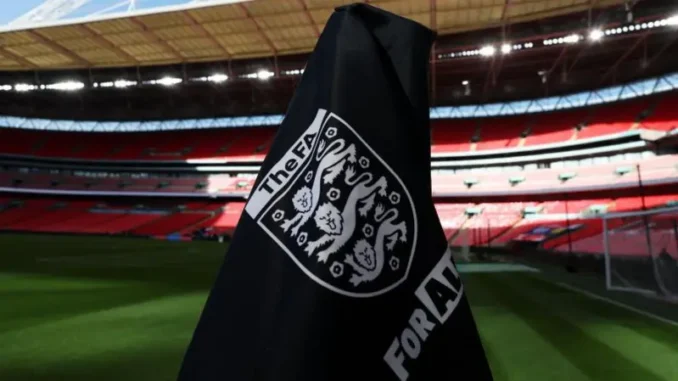
A protest outside Wembley Stadium, held before England’s match against the Republic of Ireland, has reignited debates around the Football Association’s (FA) transgender inclusion policy. The demonstration followed the controversial banning of a teenage girl from grassroots football for remarks made to a transgender opponent during a match.
The 17-year-old girl was disciplined after repeatedly asking a transgender player, “Are you a man?” during a game. The incident was reported to the FA by anti-discrimination organization Kick It Out and reviewed by an independent national serious case panel. As gender reassignment is a protected characteristic under the Equality Act 2010, the FA ruled the comments discriminatory. She was handed a six-match ban, with four of those matches suspended, and an appeal notice has since been lodged.
The unnamed teenager, reportedly autistic, denied transphobia and raised safety concerns about her opponent’s eligibility. Protesters, led by the group Twelve O Five, claimed the FA failed to ensure fairness and safety in women’s football. Around 100 people gathered with banners reading “Save Women’s Sport” and “No Men in Women’s Sport.” One protester told BBC Sport that male puberty confers physical advantages, making competition unfair and unsafe.
Former FA chairman Lord Triesman addressed the matter in the House of Lords, condemning the FA’s actions. Reflecting on past policies during his tenure, he emphasized the risks of allowing players assigned male at birth to compete against women post-puberty, citing injury risks and unfairness. He called the treatment of the teenager “shabby” and pledged not to let the issue rest.
The FA defended its position, highlighting the complexity of the case and the need to balance safety, fairness, and inclusion. It noted that the sanction was largely suspended and that most details remain confidential due to the age of those involved. The FA reaffirmed its commitment to reviewing its transgender policy to reflect evolving scientific research and societal expectations.
Currently, the FA permits transgender players aged 16 or older who meet testosterone suppression criteria to participate in women’s football. Applications are assessed case-by-case, considering fairness and safety. However, critics argue this policy inadequately addresses the advantages male puberty provides.
Over the past decade, approximately 70 transgender players have participated in grassroots football in England. None currently compete professionally in the UK, but the FA faces increasing pressure to align with stricter policies adopted by other sports. Earlier this year, the government urged major sporting bodies, including the FA, to adopt clearer positions on transgender athletes in female-only categories.
Meanwhile, supporters of inclusion, such as Football v Transphobia, stress the importance of welcoming transgender players into football. They argue that trans players, often marginalized in society, benefit significantly from opportunities to participate. The group points out that the FA’s policy, in place since 2014, has historically avoided controversy and emphasizes the need for continued support of trans players.
As global bodies like FIFA and UEFA review their policies, the FA remains committed to monitoring developments. FIFA has labeled its work on transgender inclusion a “work in progress,” aiming to strike a balance between safety, fairness, and inclusivity. This ongoing debate reflects broader challenges in ensuring equitable participation in competitive sports.
Leave a Reply